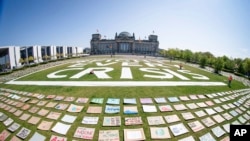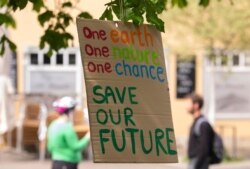The coronavirus lockdown in many European countries has led to less pollution. But policy decisions in coming months will make clear if an economic recovery helps or hurts environmental gains.
Europe’s cities, where streets are usually congested, are now quiet, as people are forced to stay at home due to the coronavirus pandemic.
Alberto Gonzalez Ortiz, an air quality expert at the European Environment Agency, says air pollution is down since lockdowns were implemented in cities across the continent.
“In some cities, it's from one week to another we see a reduction of more than half of the concentrations. The reductions are not the same in all cities. Because the lockdown measures are not the same or not so intense either in all countries and they have started at different times,” Gonzales said.
In Europe, 2019 was the hottest year ever recorded. But with millions of people forced to stay home, consuming less and traveling less, there is a reduction in emissions, carbon and air pollution.
But countries across the continent want to slowly ease restrictions to get the economy going again. Some people are concerned a quick return to life as it was before COVID-19 might undo newly gained environmental benefits.
Imke Lübbeke of the environmental group World Wildlife Fund (WWF) says there is no reason yet to celebrate about environmental gains.
“These are temporary results following from the lockdowns enforced in many countries and cities to address the spread of COVID. But they are not structural emissions reductions or a way out of air pollution yet. We are working hard to make clear that the climate change crisis and all the environmental crisis is not going away once we've addressed the COVID crisis,” Lübbeke said.
European Union leaders are discussing an economic recovery package that some say will cost about $2 trillion. And governments are promising billions to businesses, including to polluting industries.
Climate Action Network Europe Director Wendel Trio says this moment in history is an opportunity for governments to decide if they want to steer the recovery in a direction that makes current gains lasting.
“Both carmakers and airlines, for instance, have been rather reluctant to accept the changes that are needed to go to a climate-neutral society. And I think now is the time to make it clear to them. If they want public money, if they want the taxpayer to pay for their future, then actually their future should also be of benefit to society,” Trio said.
There is a fear among some climate advocacy groups that the economic recovery will be valued more highly than addressing climate change.
BusinessEurope, a large corporate lobby group, already wrote to the European Union requesting a delay in climate-related regulations.
A speech on climate German Chancellor Angela Merkel is expected to deliver Monday (April 27) might indicate what the EU’s most influential member will be pushing for when it comes to balancing environmental issues against a recovering economy.





